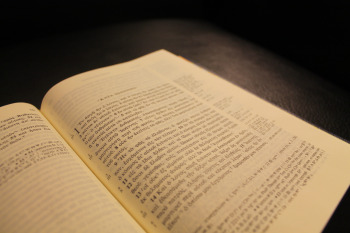 The Twenty-Fifth in A Series of Sermons on the Gospel of John
The Twenty-Fifth in A Series of Sermons on the Gospel of John
Jesus has returned to Jerusalem. The on-going conflict between Jesus and the religious leaders of Israel will now escalate. Speaking with the Father’s authority, Jesus proclaims that the people of Israel do not keep the law of Moses, and are sinners in need of a Savior. Already plotting to kill Jesus–because, ironically, the Jews consider Jesus to be a law-breaker–some of those opposing Jesus accuse him of being demon possessed. As the tension increases, the people of Israel are now forced to choose whether they will follow Jesus or reject him. From this point on in John’s Gospel, the messianic mission of Jesus will center in and around the city of Jerusalem, and the leaders of the Jews will keep plotting to kill him. All roads now lead to the cross and the empty tomb because this is the will of YHWH, and Jesus’ mission requires him to fulfill his Father’s will.
We are continuing our series on the Gospel of John, and we move into a new section of the Gospel, recounting those events which took place in Jerusalem during the Feast of Booths (Tabernacles). These events take place about six months after Jesus gave the “bread of life” discourse in the synagogue in Capernaum (in the Galilee region). Chapters 7-10 of John, which record this so-called “conflict” phase of Jesus’ ministry, are characterized by an increasing tension between Jesus and the Jewish religious authorities in Jerusalem (the Sanhedrin). This tension stems from Jesus’ previous trip to Jerusalem (a year earlier), when Jesus healed an invalid on the Sabbath as recounted in John 5:18, where we read, “this was why the Jews were seeking all the more to kill [Jesus], because not only was he breaking the Sabbath, but he was even calling God his own Father, making himself equal with God.”
Although the increasing tension between Jesus and the Jewish leaders occurs during Feast of Booths, the nature of the Feast itself does not enter into the dispute. But the celebration of the Feast does serve as the setting for the various disputes between Jesus and the Jews which are recounted in the next few chapters. This is not the final conflict between Jesus and the members of the Sanhedrin (that will come during the Passover a few months later), but the vast divide between Jesus and the Jewish leaders is now fully out in the open. Once this happens, the people are now forced to take sides. The differences over the meaning of the Sabbath, and Jesus’ claims to deity became clear in chapter five. New issues arise in chapters 7-10, specifically questions about Jesus’ relationship to Abraham, Jesus’ authority and his interpretation of the Old Testament (particularly the way Jesus places himself at the center of Israel’s history), and Jesus’ assertion that the religious leaders of Israel are actually in league with the devil.
Since we have much ground to cover today, let us turn to our text, verse 1 of chapter 7. “After this Jesus went about in Galilee. He would not go about in Judea, because the Jews were seeking to kill him.” John does not specify how much time has elapsed since Jesus gave the “bread of life” discourse in Capernaum but since the Passover occurs in the spring and the Feast of Booths late in the Fall, it is safe to say that about six months have elapsed since the events of John 6. The synoptic Gospels devote much attention to this period in our Lord’s ministry in the Galilee, but John says nothing about it. According to John’s account, Jesus stayed in the Galilee region because the Jews in Jerusalem (the capitol of Judea) were threatening to kill him.
To read the rest of this sermon, Click Here
 Wednesday, April 1, 2015 at 03:03PM
Wednesday, April 1, 2015 at 03:03PM  Francis Turretin once said of our Lord's Three-Fold Office,
Francis Turretin once said of our Lord's Three-Fold Office,








